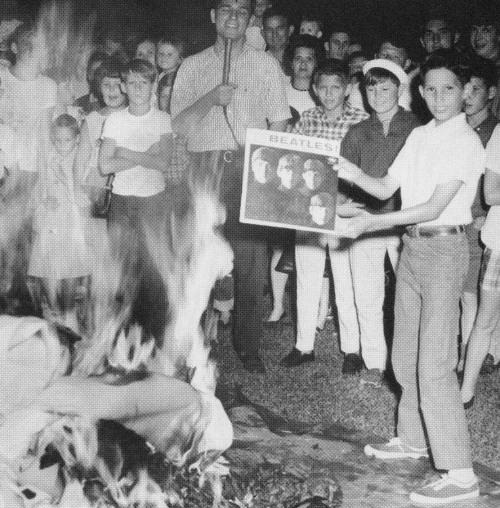TidiousTed
Practically Family
- Messages
- 532
- Location
- Oslo, Norway
The ultimate in hipster irony: reading Fahrenheit 451 on a Kindle.
:eusa_clap:eusa_clap:eusa_clap
The ultimate in hipster irony: reading Fahrenheit 451 on a Kindle.
The ultimate in hipster irony: reading Fahrenheit 451 on a Kindle.
Ray Bradbury, to his credit, has refused to allow Fahrenheit 451 to be released on Kindle.
Seems a little short-sighted to me, but fair enough if that's what he wants. [huh]
Yeah, it was like The Beatles not allowing their content on iTunes (now of course they do)
Cutting off one's nose to spite their face never seems a good plan...but that sort of arrogance sometimes creeps into the lives of the highly successful - until they need more money
Although I've been working on PCs since I bought my first production unit in 1987 and have worked on computers ever since I would never consider reading a book on a screen of any sort. Books should be read printed on paper sitting in a comfortable easy chair preferably accompanied by a cup of decent assam and a glass of old port.
Didn't realize this thread was meant to convince people to go either way.
Just a discussion on differing opinions.
Do as you like and enjoy it.
Depends on the reason why and the material that I am reading. For technical material there is nothing like E-type readers as I am required to look at several sources at once and quick hits on an e-page beats juggling several books at once.
...Sure, there's some irony in reading the book on an e-reader, but pragmatically, the most important goal should be to have people reading works of substance. If a person is reading Fahrenheit 451 on an e-reader, at least s/he's reading it. Get the message out. That's what counts.

 John Lofgren Monkey Boots Shinki Horsebuttt - $1,136 The classic monkey boot silhouette in an incredibly rich Shinki russet horse leather.
John Lofgren Monkey Boots Shinki Horsebuttt - $1,136 The classic monkey boot silhouette in an incredibly rich Shinki russet horse leather.  Grant Stone Diesel Boot Dark Olive Chromexcel - $395 Goodyear welted, Horween Chromexcel, classic good looks.
Grant Stone Diesel Boot Dark Olive Chromexcel - $395 Goodyear welted, Horween Chromexcel, classic good looks.  Schott 568 Vandals Jacket - $1,250 The classic Perfecto motorcycle jacket, in a very special limited-edition Schott double rider style.
Schott 568 Vandals Jacket - $1,250 The classic Perfecto motorcycle jacket, in a very special limited-edition Schott double rider style. I've just been rereading Nicholas Baker's "Double Fold," a study of the mass destruction of books and, especially, newspapers by libraries and institutions, in favor of microfilm replacements. Baker points out that, in the case of newspapers, there are many 20th Century papers of great historical importance of which no full runs of original copies are known to survive anywhere in the world.
So what? Well, if you've ever tried to do serious research in newspapers using microfilm copies, you know So What -- much of what exists in this format is poorly photographed, incomplete and illegible. Color plates and rotogravure sections exist, if at all, in badly-duplicated distorted black-and-white. Regular photos often show up only as impenetrable black blobs. Multiple editions of the same day's paper are rarely, if ever, microfilmed so vitally important stories are lost -- Baker cites coverage of a major news development involving the Nixon administration from 1972 which no longer exists in any form because it appeared in an early edition of a Chicago paper and was deleted from subsequent editions because of Administration protests. The "final" was the edition of that paper microfilmed, and no hard copies are known to exist of the earlier editions. So that article has, in a very real and meaningful sense, disappeared down Orwell's memory hole. It once existed in tangible form. Now, it doesn't.
This isn't fictive speculation -- this is really happening, right now. And with the push to digitize digitize digitize, it's only going to get worse -- because in many if not most cases, all that's left to digitize are these corrupt microfilm versions. And that means the big question isn't whether our history is subject to editing -- it's *who gets to do the editing? And what's their agenda?*
Think about that the next time you consult Google News to research some topic on your iPad.
Books on screens make my eyes hurt.
Books on paper don't.
Books on paper smell good.
Books on screens don't.
Books on screens disappear when the battery runs out.
Books on paper don't.
Books on paper insulate the living room.
Books on screens don't.
Where do we store all this paper?
Who pays for it?
Who manages and maintains it?
Well, let's see -- repositories of human knowledge. Wouldn't that be the responsibility of, say, our universities? Or is their money better spent on football teams and trendy MBA programs? ...